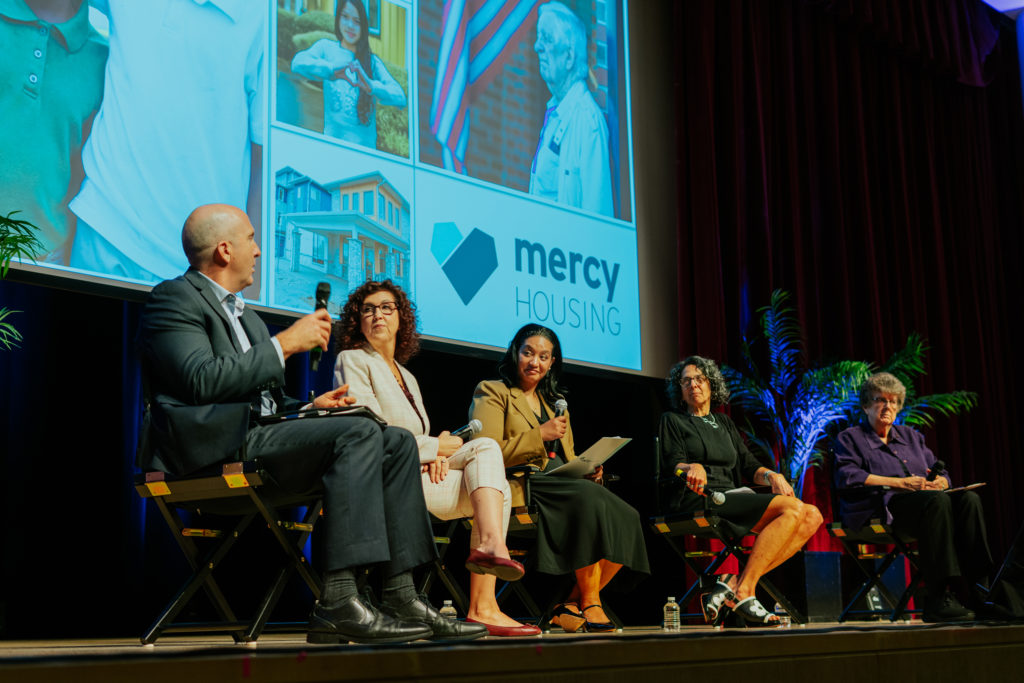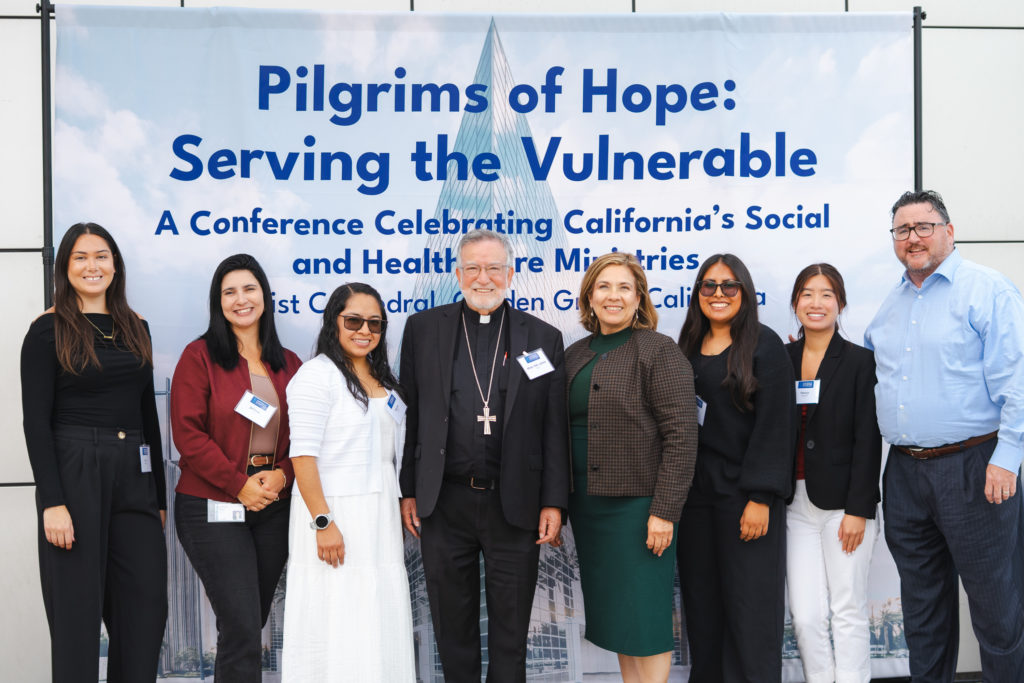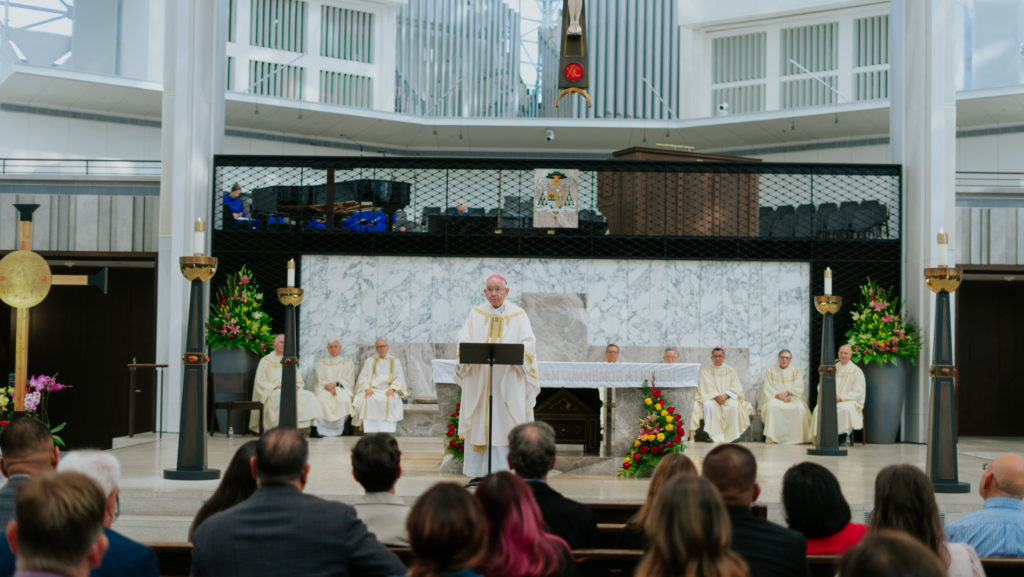Speaking to Catholics from across California, San Jose Bishop Oscar Cantú relayed a story that took place when he visited war-torn Gaza in 2015 after a war with Israel.
While visiting a Catholic school there, a student said they had food and water, but were still missing one thing.
“What we don’t have is dignity,” Cantú said the student responded.
“So today, on behalf of the Church, on behalf of my brother bishops,” Cantú told the crowd. “I say thank you for bringing dignity to people’s lives.”
Cantú delivered the remarks during the “Pilgrims of Hope: Serving the Vulnerable” conference at Christ Cathedral in Orange County on Oct. 9-10. Attendees were part of social and health-care ministries across the state, with many representing their local Catholic Charities organization.
The event was a two-day gathering where ministry leaders spoke about their work, their challenges, and how they can serve their communities in the future, be it through immigration, food distribution, homelessness, health care, and more.
In his homily during the first day’s Mass, Cantú emphasized hope, not only because it’s the Jubilee Year of Hope, but because it can cut through the dark moments of suffering that people are experiencing.
“We speak and hear a lot about faith, a lot about love — not so much about hope,” Cantú said. “But hope is mighty. Hope is powerful. Hope is so desperately needed, especially in the world today. When things get dark, when the light goes dim, and people’s possibilities become fewer, it’s precisely in these moments that we as people, as the Church, must lead with hope.”
Along with Cantú, several of California’s bishops led Masses, liturgies, and prayer sessions — including Los Angeles Archbishop José H. Gomez, Orange County Bishop Kevin Vann, and Fresno Bishop Joseph Brennan, among others — while several local leaders, such as Msgr. Greg Cox, executive director of Catholic Charities of Los Angeles, and David Garcia, executive director of St. Vincent de Paul Los Angeles, appeared on panels.

In his homily on the second day’s Mass, Archbishop Gomez mentioned Father Chris Ponnet, a longtime social justice advocate in the LA Archdiocese who died on Oct. 7 at the age of 68.
“His death comes as a shock to us, and he will be greatly missed,” Archbishop Gomez said. “For more than 30 years, Father Chris was an advocate for social justice and health care for the poor and most vulnerable. Father Chris tried to live every day the Gospel that we just heard, seeking the face of Jesus in the poor, the prisoner, those on death row, the immigrant.”
Several of the speakers during their sessions said that while many of those whom they serve are suffering, they approach their efforts as an instrument of God’s providence.
“Why is it so important now?” said Appaswamy “Vino” Pajanor, the CEO of Catholic Charities of the Diocese of San Diego. “Because behind every acronym and funding stream is a person, a parent seeking safety, a young adult hoping to study without fear, a worker anchoring a household. Our task is to pair competent services with compassionate accompaniment, so people are seen, protected and empowered to belong.”
The immigration discussion, in particular, was tinged with grappling with the ever-changing landscape since the Trump administration took over in January.
Sister Suzanne Jabro, CSJ, founder of the Center for Restorative Justice Works and the Border Compassion migrant shelter in Mexico, told the audience that the “them” vs. “us” mentality in the United States needed to change.
“There is no them and us,” Jabro said. “There’s just us.
“U.S. immigration policies must not victimize victims. When we ever get a policy that we can work with, this cannot be going on like it has. In the United States, we can feel the violence. We can hear it in the rhetoric. You hear the energy of it. And our brothers and sisters’ dignity is attacked. They are depersonalized, demoralized and dehumanized. It’s as if there’s a blame that you’re the reason for our problems.”
Qalim Cromer, an immigration attorney working with Catholic Charities of the Diocese of Monterey, said that because of how much has changed since January, they need to remember why they’re doing this work in the first place.
“It could be driving with your client to an ICE check-in because they don’t know if they’re going to get arrested,” Cromer said. “It could be answering the phone for families whose family members have disappeared in the United States and they don’t know what happened to them.
“You better know why you’re doing this, because it’ll change on you. “
Fred Buzo, the director of advocacy and community engagement at Catholic Charities of Santa Clara County, knew why he was doing what he was doing: feeding the hungry.
“It’s faith in action,” he said. “It’s rooted in Catholic social teaching and the Gospel mission. We’re just not here to meet needs, but we’re here to live our faith.
“The reality is that you can take all the funding away, you can make it zero, and we’re still going to do this. We’re still going to feed one person, if that’s all we can do.”


